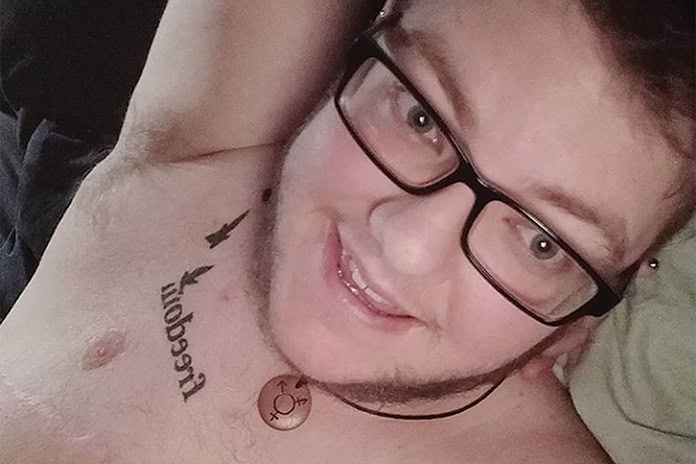We take a deep dive into the procedure commonly known as “top surgery”.
How much do you know about “top surgery”? We take a deep dive into the procedure giving trans men a new lease of life.
Despite the conversation around transgender rights being more wide-spread than ever, it’s very rare that people get themselves informed on the specifics surrounding the issue. What’s it really like being a trans person seeking to affirm their identity through surgery? One procedure that is central in the trans male experience of medically transitioning is the Chest Wall Gender Reassignment Surgery, commonly known as “top surgery”. The FtM chest wall reconstruction transforms the upper torso to look more masculine by removing excess breast tissue and skin. To find out about the experience around having the surgery, we met up with retail worker Jestin Bartlett, 22 from Colchester to talk about his journey in pursing and undergoing the procedure as well as life after.
So Jestin, can you remember the moment when you realised that top surgery was something you needed to happen?
Before I came out as male, I wanted it. Probably from when I first started puberty and my chest first started growing. I thought “this isn’t right, this isn’t normal” but at that point, I didn’t know what trans was, or queer was. The more I was being put in the female category, the more it felt wrong. As soon as I discovered that being trans was a thing I realised “I’m not weird, that’s me.” That gave me the confidence to realise that it’s normal to want your chest to go, it’s part of the trans experience.
I was 17 when I first started coming out properly, started living as male and binding when I was 18. The only thought I had was that I needed chest surgery. As soon as possible. I needed it.
Was that when you became aware of the barriers you’d be coming up against in pursuing it on the NHS?
I started the medical process when I was 18. I went to my GP and they said they had no idea what a Gender Identity Clinic was, saying they had no idea what to do. I plucked up the courage over two months to start living as male, I changed my name but was putting off the medical process. I needed to get the ball rolling. I was finally referred to a psychiatrist for an in-depth assessment, waiting three months for that. I saw them for a three-hour appointment where they established I wasn’t just “confused”, I was just trans. He sent my gender referral along on my 19th birthday.
Luckily, I was able to grab an early appointment because of a cancellation. I phoned up to change my address and they said they had a cancellation the week after. If I hadn’t just happened to have called, I would’ve been waiting another 6 months. I started going on testosterone after my 21st birthday. It would be my 22nd birthday before I had my top surgery.
You didn’t end up having the surgery on the NHS because of long waiting long lists. How did you come to that decision?
Following an appointment in March, I got my referral for surgery in mid-June. Normally when you get referred for surgery you wait three to six months. My surgery was due to take place in the summer. When I was telling my father about it, he thought “Great, so just a month?” and I had to tell him it was in fact next summer. A year was the shortest waiting list going at that time. Then NHS’s funding went tits-up for a while, people losing their funding for a few weeks or even months.

Stressful. Anyone who doesn’t know the transition pathway thinks it’s a quick process. Even getting on hormones. I was out and living as male when I first walked into Uni, it was another two and a half years that I actually started hormones. Normally when you have a medical issue, you’re treated quite quickly, but in the trans world, you’re waiting years and years for it. I couldn’t wait another year, year and a half for surgery.
Going private isn’t something everyone could consider doing financially. Did the price tag way heavily on you?
When I first looked at the figures, I didn’t think it was a possibility. Luckily, my dad turned around and said he’d give me some money towards it if it would help. I had some savings, but I realised I’d have to work hard for it to be a viable option. I did a stupid amount of overtime to reach that goal.
Did you resent having to work this hard? Was there a feeling that your country’s health system should be taking care of this?
This is normal in trans healthcare. You hate it, but you expect it. After my private appointment, I was sent a message saying my surgery was in 50 days. I was driving back from the coast with my friends when the message came through and we all screamed.
Then it’s four days before surgery, you leave work for the last time pre-surgery. What are you feeling?
That it wasn’t real. I was convinced something was going to come up and for it not to happen. It didn’t set in ‘til about a week after the surgery. When I had my post-op, it wasn’t until I had all my dressings taken off that it set in that it had happened. It didn’t feel real. It was a huge relief. I can remember looking down, seeing it was flat and thinking “wow, what is this.”
You then slowly go back into your day-to-day life.
I felt like a new person. On the way home from my post-op, I popped into work and bumped into my manager who said: “I can’t believe how un-flat you were.” I hid a lot more before surgery. In summer I’d have to awkwardly hide my binder. That summer I could confidently wear a vest top and not have to worry. I can say that if I hadn’t had the surgery, I probably wouldn’t be here.
What advice would you give to someone desperate to have the surgery done?
It will eventually come around, and it is worth it. It’s worth the wait, however long it is. It’s worth it.

“The psychological impact of chest wall surgery cannot be underestimated. In delivering gender reassignment surgery we help to align the patients’ physical appearance with their internal reality. Doing this in a timely fashion empowers patients and enables them to get on with their lives in their correct gender role. Sometimes NHS waiting lists can delay this process leading to frustration and even depression. However, there is a positive reason for these waiting lists being so long, and one if them is that stringent standards are in place regarding the provision of gender surgery and it takes a while for new providers to be approved. Also it can only be offered after detailed psychological assessment and, again, time is paramount here in ensuring patients and their families have had appropriate support and time to digest the information and consider whether surgery is the way forward for them.
For those who have been through appropriate counselling, and for whom surgery has been approved, it is also available privately. It is imperative you look for a surgeon who has experience in gender surgery and it is a good idea to look for a member of the British Association of Gender Identity Specialists. Ask to see photos of their previous work and you can also search for personal recommendations on online forums.”












